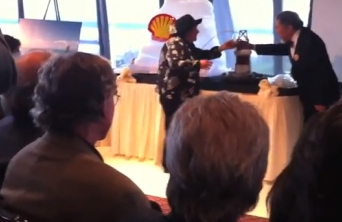Greenpeace, Yes Men Claim Fake Shell Video Gone Viral
A video portraying a Shell Oil arctic launch reception gone wrong at the Seattle Space Needle went viral on June 7. Although it was soon discovered to be fake, its true origin remained unknown.
Today, the mystery has been solved. Greenpeace issued a press release stating that the organization worked with the Yes Men and members of the Seattle branch of the Occupy Wall Street movement to produce the video.
"This experience shows that a few energized people can compete with the billions that Shell spends on advertising and lobbying," said James Turner from Greenpeace in the press release. "As people find out how this oil company is exploiting global warming to cause yet more global warming, thus endangering everyone, they won't allow it, no matter how many billions Shell has in its war chest."
The video, which launched Twitter hashtag #ShellFAIL, shows a small replica of a drilling rig spouting alcohol sprayed onto a guest of honor at the party.
WATCH:
After the release of the video, the team also sent an announcement of legal action under the guise of Shell Oil. A representative of the energy company promptly told Gawker Media that the announcement was also fake.
The Yes Men also produced a behind-the-scenes video about the preparation and reasoning behind their elaborate hoax.
A member of the Yes Men Lab, credited as "Andy," showed the scale model of the drilling rig used in the video.
"It's a model of the Kulluk drill rig which is about to leave this port of Seattle and about to go up to Alaska to start drilling for oil now that the polar ice has melted," he said.
WATCH:
Indeed, the video was produced to bring attention to Shell's planned exploratory endeavors in the Arctic, which have been criticized as unsafe both operationally and environmentally. The Los Angeles Times reported the rig as heading up to Alaska's Beaufort and Chukchi seas, which see very little human activity but are described as "the nurseries of the earth."
"Even if it doesn't spill a drop of oil, Shell's fleet will release thousands of tons of industrial carbon, nitrogen dioxide and other pollutants into the air every year, adding to levels of toxic chemicals and acid in the northern waters," reported the LA Times.
Shell, however, has remained steadfast in its operations, investing at least $4 billion in the project and hoping to tap into one of the largest reserves ever discovered in the U.S.






